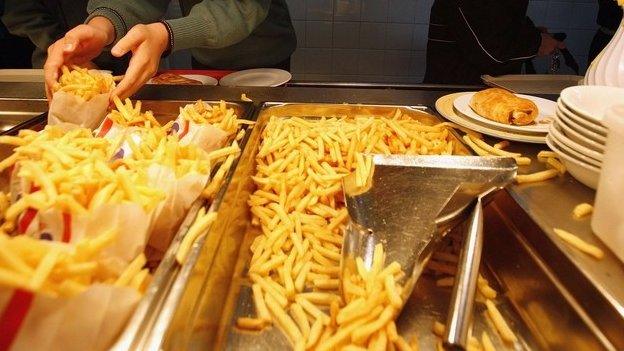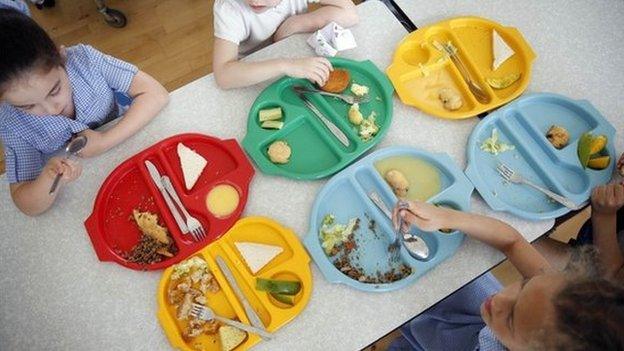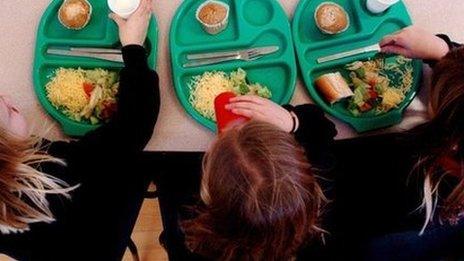New rules for healthy school dinners
- Published
- comments

Fried food is limited to two portions each week in England's schools
New rules for school meals in England will come into force next week, at the beginning of the new term.
Meals must include one or more portions of vegetables or salad every day and no more than two portions of fried foods or pastry-based foods each week.
The rules promote drinking water and limit fruit juice servings to 150ml.
The new regulations, external are mandatory for local authority schools, new free schools and schools that convert to academy status.
They stipulate:
one or more portions of vegetables or salad as an accompaniment every day
at least three different fruits and three different vegetables each week
an emphasis on wholegrain foods in place of refined carbohydrates
an emphasis on making water the drink of choice
limiting fruit juice portions to quarter pints (150ml)
restricting the amount of added sugars or honey in other drinks to 5%
no more than two portions a week of food that has been deep-fried, batter-coated or breadcrumb-coated
no more than two portions of food that include pastry each week
a portion of milk (lower fat and lactose reduced) to be made available once a day
Details of the new school food plan were unveiled by ministers in June, following a review of school meals by founders of the Leon food chain John Vincent and Henry Dimbleby.
In July 2012, the then-Education Secretary, Michael Gove, asked the restaurateurs to examine nutrition in England's schools and see how it could be improved.

The school food plan is designed to promote healthy eating
The new regulations are in response to those findings and replace ones introduced in the wake of a campaign by celebrity chef Jamie Oliver to improve the standard of food in schools.
Mr Oliver led a successful campaign to ban junk and processed food from school canteens and tight nutritional guidelines were brought in.
However, he expressed frustration at the time that academy schools were exempt from these rules.
Academy exemption
Under the new school food plan, academies established before 2010 or after June 2014 are obliged to follow the standards set out.
But those founded between 2010 and June 2014 remain exempt.
The Department for Education said these schools were being encouraged to sign up to the plan voluntarily and hundreds had already done so.
The department said the previous rules had done "much to improve school food" but "were complicated and expensive to enforce".
The revised regulations were intended to give school cooks more "flexibility", it said.

Academy schools which are exempt from the food plan are expected to sign up to it nonetheless
Dr Patricia Mucavele, head of nutrition at the Children's Food Trust, welcomed the new standards, saying variety was key.
"We tested the new standards with the people who would be using them - school caterers and cooks," she said.
"They told us the new standards were easier and more intuitive to use to plan interesting and creative menus, which has got to be great news for children and school food."
- Published17 June 2014

- Published18 December 2014

- Published8 October 2014

- Published4 July 2012
